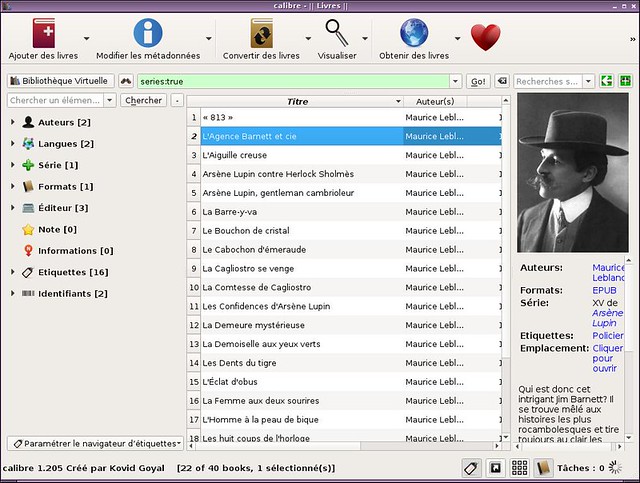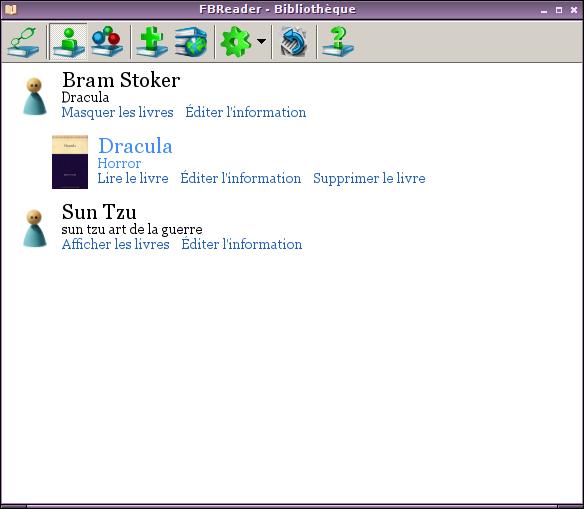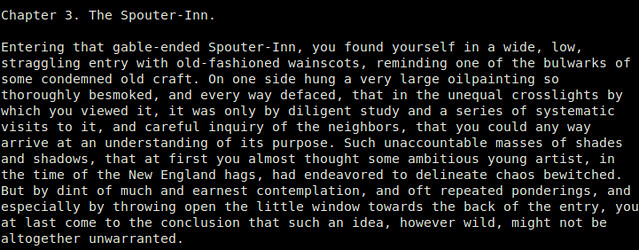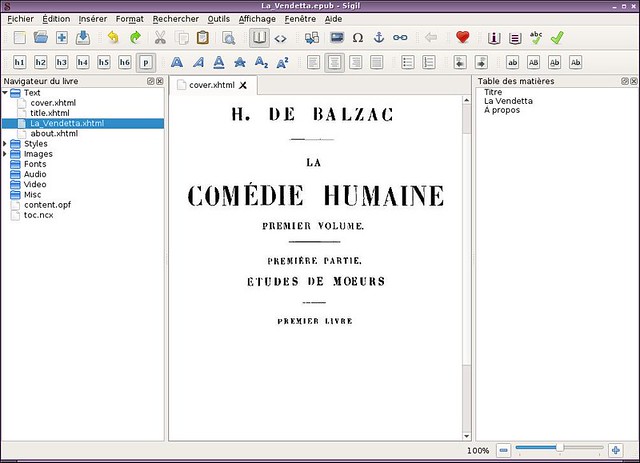mirror of
https://github.com/LCTT/TranslateProject.git
synced 2024-12-26 21:30:55 +08:00
66 lines
5.3 KiB
Markdown
66 lines
5.3 KiB
Markdown
|
|
What is a good EPUB reader on Linux
|
||
|
|
================================================================================
|
||
|
|
If the habit on reading books on electronic tablets is still on its way, reading books on a computer is even rarer. It is hard enough to focus on the classics of the 16th century literature, so who needs the Facebook chat pop up sound in the background in addition? But if for some reasons you wish to open an electronic book in your computer, chances are that you will need specific software. Indeed, most editors agreed with using the EPUB format for electronic books (for "Electronic PUBlication"). Hopefully, Linux is not deprived of good programs capable of dealing with such format. In short, here is a non-exhaustive list of good EPUB readers on Linux.
|
||
|
|
|
||
|
|
### 1. Calibre ###
|
||
|
|
|
||
|
|

|
||
|
|
|
||
|
|
Let's dive in with maybe the biggest name of that list: [Calibre][1]. More than just an ebook reader, Calibre is a fully packaged e-library. It supports a plethora of formats (almost every I can think of), integrates a reader, a manager, a meta-data editor which can download covers from the Internet, an EPUB editor, a news reader, and a search engine to download additional books. To top it all, the interface is slick and has nothing to envy to other professional software. The only potential downside is that if you are looking for an EPUB reader, and are not interested in the whole library manager aspect, the program is too heavy for your needs.
|
||
|
|
|
||
|
|
### 2. FBReader ###
|
||
|
|
|
||
|
|

|
||
|
|
|
||
|
|
[FBReader][2] is also a library manager, but in a lighter way than Calibre. The interface is more sober, and is clearly cut in two: (1) the library aspect where you can add files, edit the meta-data, or download new books, and (2) the reader aspect. If you like simplicity, you might enjoy this program. I personally appreciate its straightforward tag and series system for classifying books.
|
||
|
|
|
||
|
|
### 3. Cool Reader ###
|
||
|
|
|
||
|
|

|
||
|
|
|
||
|
|
For all of you who are just looking for a way to visualize the content of an EPUB file, I recommend [Cool Reader][5]. In the spirit of Linux applications which do only one thing and do it well, Cool Reader is optimized to just open an EPUB file, and navigate through it via handy shortcuts. And since it is based on Qt, it also follows Qt's mentality by giving a ton of settings to mess around with.
|
||
|
|
|
||
|
|
### 4. Okular ###
|
||
|
|
|
||
|
|

|
||
|
|
|
||
|
|
Since we were talking about Qt applications, one of KDE's main document viewer, [Okular][3], also has the capacity to view EPUB files, once an EPUB library has been installed on the system. However, this is probably not a very good option if you are not a KDE user.
|
||
|
|
|
||
|
|
### 5. pPub ###
|
||
|
|
|
||
|
|

|
||
|
|
|
||
|
|
[pPub][4] is an old project that you can still find on Github. Its latest change seems to have been made two years ago. However, pPub is one of those programs that really deserve a second life. Written in Python and based on GTK3 and WebKit, pPub is lightweight and intuitive. The interface probably needs a little updating and is beyond sober, but the core is very good. It even supports JavaScript. So please, someone kick that up again.
|
||
|
|
|
||
|
|
### 6. epub ###
|
||
|
|
|
||
|
|

|
||
|
|
|
||
|
|
If all you need is a quick and easy way to check the content of an EPUB file, without caring about any fancy GUI, maybe an EPUB reader with command line interface might just do. [epub][6] is a minimalistic EPUB reader written in Python, which allows you to read an EPUB file in a terminal environment. You can switch between chapter/TOC views, up/down a page, and nothing more. This is as simple as any EPUB reader can possibly get.
|
||
|
|
|
||
|
|
### 7. Sigil ###
|
||
|
|
|
||
|
|

|
||
|
|
|
||
|
|
Finally, last of the list is not actually an EPUB reader, but more of a standalone editor. [Sigil][7] is able to extract the content of an EPUB file, and break it down for what it really is: xhtml text, images, styles, and sometimes audio. The interface is a lot more complex than the one for a basic reader, but remains clear and well thought, on par with the features it provides. I particularly appreciate the tab system. If you are familiar with editing web pages, you will be in know territory here.
|
||
|
|
|
||
|
|
To conclude, there are a lot of open source EPUB readers out there. Some do nothing more, while others go way beyond that. As usual, I recommend using the one that makes the most sense for you to use. If you know more good EPUB readers on Linux that you like, please let us know in the comments.
|
||
|
|
|
||
|
|
--------------------------------------------------------------------------------
|
||
|
|
|
||
|
|
via: http://xmodulo.com/2014/08/good-epub-reader-linux.html
|
||
|
|
|
||
|
|
作者:[Adrien Brochard][a]
|
||
|
|
译者:[译者ID](https://github.com/译者ID)
|
||
|
|
校对:[校对者ID](https://github.com/校对者ID)
|
||
|
|
|
||
|
|
本文由 [LCTT](https://github.com/LCTT/TranslateProject) 原创翻译,[Linux中国](http://linux.cn/) 荣誉推出
|
||
|
|
|
||
|
|
[a]:http://xmodulo.com/author/adrien
|
||
|
|
[1]:http://calibre-ebook.com/
|
||
|
|
[2]:http://fbreader.org/
|
||
|
|
[3]:http://okular.kde.org/
|
||
|
|
[4]:https://github.com/sakisds/pPub
|
||
|
|
[5]:http://crengine.sourceforge.net/
|
||
|
|
[6]:https://github.com/rupa/epub
|
||
|
|
[7]:https://github.com/user-none/Sigil
|